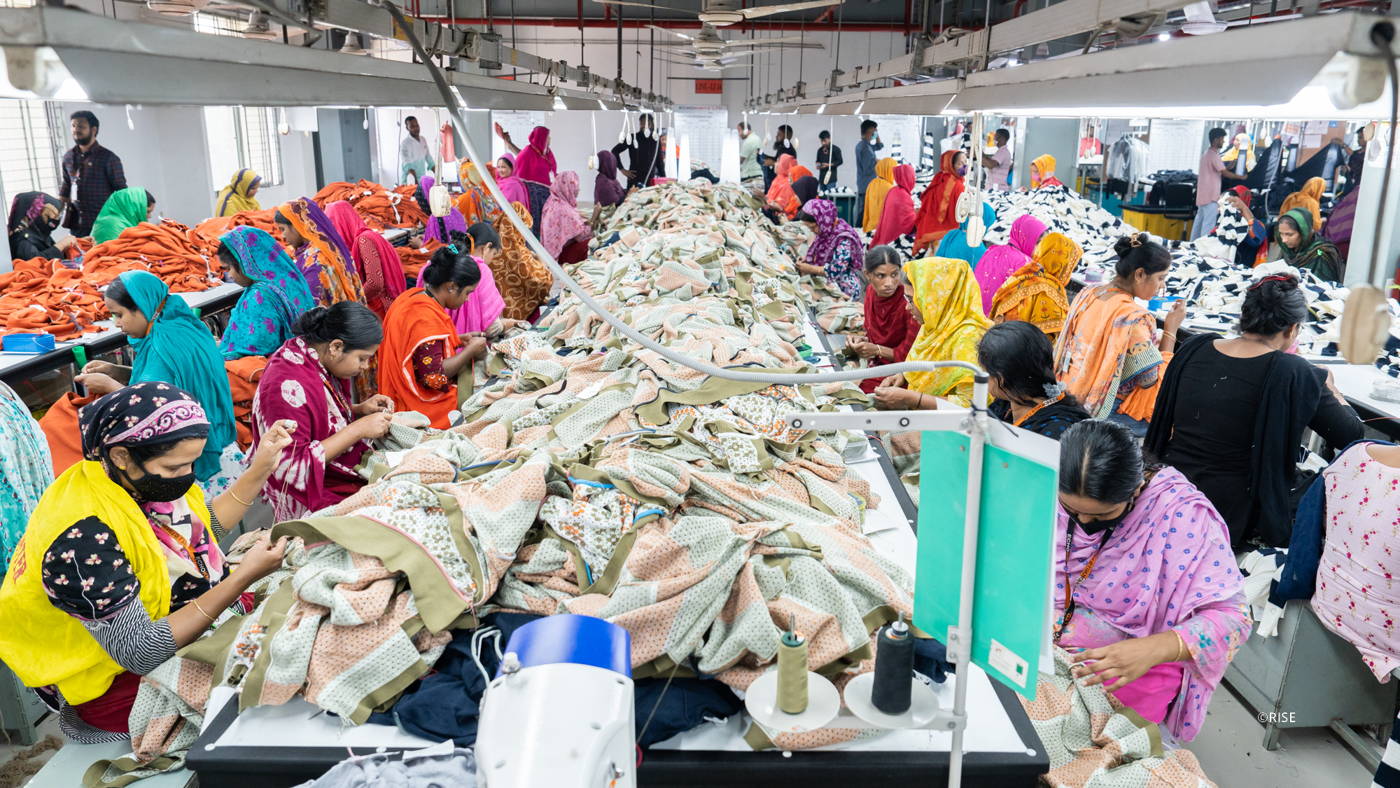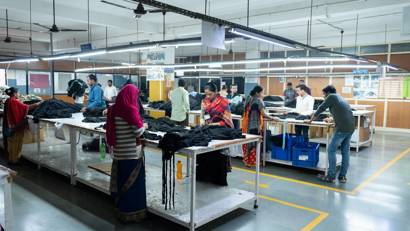
The International Labor Organization’s Violence and Harassment in the World of Work Convention (C190), the first international treaty to provide a framework for governments, employers and workers to prevent, address and remediate violence and harassment in the world of work, turned five earlier this year.
C190 informs RISE Respect programmatic work to address gender-based violence and harassment (GBVH) in global garment supply chains. Ending GBVH is a priority for RISE as part of our broader work to enable women workers to experience their inherent dignity through agency, equality and rights.
C190 provides an internationally agreed framework for shaping a future of work based on dignity and respect for all. It is groundbreaking as it establishes the right of everyone to work free from violence and harassment, including gender-based violence and harassment. To date, 45 governments have ratified the convention, and many organizations are using C190 as their blueprint for action to eliminate violence and harassment.
The developing European and international regulatory frameworks, including C190 and the EU Corporate Sustainability Due Diligence Directive (CSDDD), are helping to shape stakeholders’ obligations and encourage them to take concrete action towards ending GBVH. One way forward is to ensure meaningful industry collaboration so that brands, suppliers and workers’ organizations partner to create an enabling and safe working environment free of violence and harassment. Industry collaboration can achieve lasting progress at the individual and structural levels.
RISE is one example of such collaborative action as we partner with brands, buyers, suppliers, women’s organizations, workers’ organizations, trade unions, and other stakeholders to collectively address GBVH in supply chains, including by understanding and identifying risks and focusing on prevention and remediation.
5 concrete collaborative actions for the garment sector to help end GBVH
1/ Take a woman-centered approach, ensuring that women workers are prioritized, and their voices heard. Industry-wide commitments and engagements must be driven by what women say and women’s needs must be prioritized during design and delivery of GBVH programs. Freedom of association and a strong focus on social dialogue, including collective bargaining, are crucial to ensuring women’s voice and leadership in trade unions, which can help to bring the issues into the workplace. Article 5 of C190 states that eliminating violence and harassment means that Member States “shall respect, promote and realize the fundamental principles and rights at work, namely freedom of association and the effective recognition of the right to collective bargaining”. A woman-centered approach also includes processes and services that are survivors-centered, ensuring that women get the support they need for mental, physical and emotional healing.
This woman-centered approach is a pillar of RISE Respect. Every time RISE expands and adapts its programs to a new context, the team carries out formative research in partnership with local organizations to hear directly from women workers and identify their needs. RISE also engages with women´s rights organizations and women’s unions to include their perspective. Finally, RISE connects survivors with service providers outside of the workplace to ensure that women get the adequate support.
2/ Understand and address the underlying social norms which enable GBVH. Gender inequality is the primary driver of GBVH. Violence against women is normalized in many societies, and patriarchal social norms and relationships stemming from gender inequality underpin many GBVH risk factors, which is something C190 acknowledges in its preamble.
RISE supports progress, not just for the individual worker, but for women workers collectively, and so recognizes the importance of addressing restrictive gender norms inside and outside the workplace. This can only happen by engaging stakeholders and experts to address social norms in the workplace and beyond the factory walls.
3/ Focus on GBVH prevention in factories. Prevention is critical to the elimination of GBVH, as it can stop GBVH before it occurs. The next step for brands and suppliers is to give a more detailed focus to the prevention of GBVH by taking into effect multiple risk factors and, as far as possible, introducing prevention programs that eliminate these risks. C190 provides a way to do this through occupational safety and health (OSH). Many forward-looking companies are beginning to introduce and integrate GBVH into risk assessment procedures.
RISE Respect has been working across six countries (India, Bangladesh, Vietnam, Ethiopia, Indonesia and Kenya), supporting over 66 suppliers and impacting 80,000+ workers, through participatory training for workers and managers. The program includes joint sessions between workers and managers to provide a safe space for dialogue and develop mutually agreed strategies for prevention. RISE Respect also provides in-depth support to factory management on strengthening policies and mechanisms to prevent and remediate GBVH. In Bangladesh, after the program, there was a 53%-point decrease in participants accepting some form of violence against women, and 85% of participants surveyed at endline were aware of what constitute sexual harassment compared to 54% at baseline.
4/ Adopt a proactive supplier/buyer partnership approach over a zero-tolerance compliance approach. Zero-tolerance approaches to GBVH can be counterproductive and make it easier or less risky for suppliers to hide occurrences of GBVH instead of taking steps to address it. This often leaves survivors unattended and workplaces with weak mechanisms and tools to prevent, address and remediate GBVH.
RISE encourages brands and suppliers to adopt a “zero tolerance to inaction” approach built on meaningful collaboration between suppliers and brands. This means that when cases of GBVH are reported or identified, brands work closely with suppliers, rather than ending business relationships.
RISE’s work is part of a wider context of sectoral initiatives addressing GBVH. The Dindigul Agreement to End Gender-Based Violence and Harassment (India) and the Lesotho Anti-GBVH Program are good examples of collaborative and constructive approaches towards the prevention and elimination of all forms of violence and harassment against women in the workplace. They encourage collaboration and taking steps together rather than a zero-tolerance approach, which puts the burden on the suppliers. A crucial part of these agreements is engaging effectively with workers and their trade unions to develop workplace policies and collective bargaining agreements that earn workers’ trust.
Another example of meaningful collaboration is that partnerships between multinational companies and global trade union federations resulted in global framework agreements (GFAs) and joint commitments to end GBVH, supported by training and review of actions by joint monitoring committees (see, for example, Inditex-IndustriALL GFA, 2019, and H&M-IndustriALL, renewed GFA, 2024, and guidelines on preventing GBVH for H&M suppliers)
5/ Collectively define measurable outputs and outcomes. Article 9 of C-190 outlines how laws can require employers to:
- take steps to introduce workplace policies,
- consider violence, harassment and associated psychosocial risks in the management of occupational safety and health,
- identify hazards and assess the risks of violence and harassment with the participation of workers and their representatives, and take measures to prevent and control them, and
- provide information and training on these issues.
To assess progress as they implement this framework, brands and suppliers need to collect gender-disaggregated data on the outcome of GBVH reports, along with women workers’ views on the implementation and outcome of actions such as workplace policies, risk assessment, prevention plans and training that contribute to safer workplaces.
The first five years since the adoption of C190 have been a reminder of the importance of a comprehensive approach that combines strong partnership, proactive prevention and survivor-centered support systems to tackle GBVH. For RISE, this has meant delivering programs in garment factories that support thousands of workers in addressing GBVH and examining the social norms that underpins it, among other initiatives.
Building on this experience, RISE and the industry can continue joining forces and taking concrete steps towards ending GBVH through the "zero tolerance to inaction" approach, supporting workers and suppliers in addressing GBVH, and challenging the social norms that enable this violence. Together, we can create a world of work where women feel safe and are empowered to thrive.
Jane Pillinger (PhD) is an academic with a background in social policy and gender equality, acting as a global expert on preventing and eliminating gender-based violence in the world of work. She has advised companies, business networks and organisations, workers organisations and governments on how to develop effective ways to address and prevent violence and harassment, with a specific focus on gender-based violence and domestic violence as a workplace issue. She has written five books and numerous articles on the subject, including the joint UN Women/ILO “Handbook Addressing Violence Against Women at Work”, co-author of a recent book “Stopping Gender-Based Violence at Work: The Campaign for an ILO Convention” (Agenda publishing) and a new global report for the ILO “Violence and harassment in the world of work” with a focus on trade union initiatives, strategies and negotiations since the adoption of C190.
- Respect
- Foundations
- India
- Indonesia
- Bangladesh
- Vietnam
- Ethiopia
- Kenya
 Isadora Loreto
Isadora Loreto
 Dr Jane Pillinger
Dr Jane Pillinger
